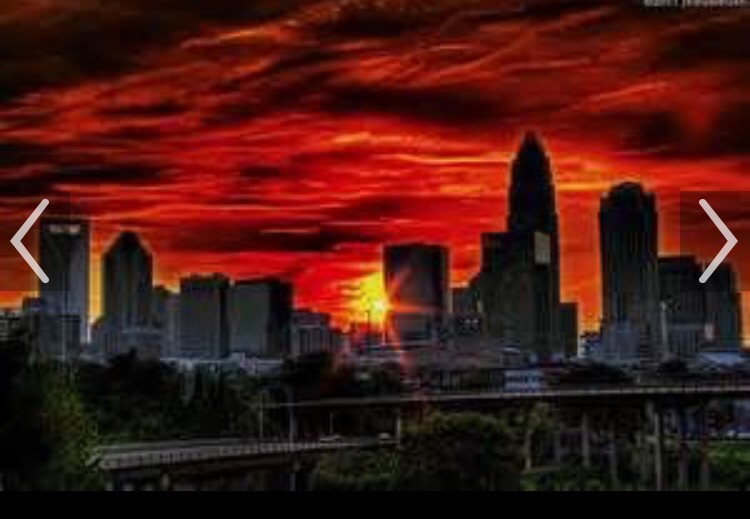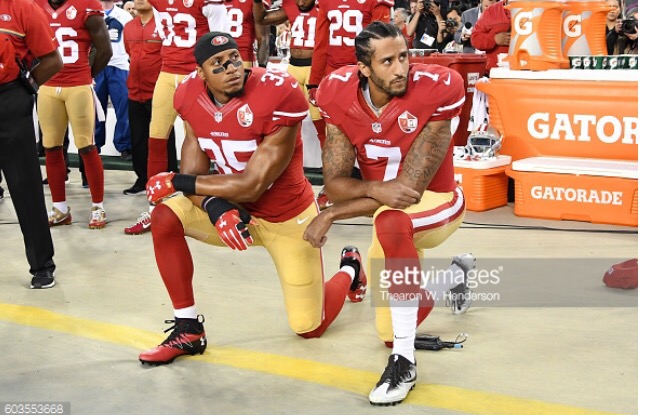 The sky over Charlotte as I drove home Thursday evening was a molten pastiche of pinks, oranges, golden rays behind clouds, and gray. On many nights, I might marvel at the beauty, but tonight I think of how Emerson claimed that nature reflects our heart back to us. My head has been swirling with thoughts all day, and my heart has been heavy. The sky seems an appropriate blanket of sorrow and confusion for this night.
The sky over Charlotte as I drove home Thursday evening was a molten pastiche of pinks, oranges, golden rays behind clouds, and gray. On many nights, I might marvel at the beauty, but tonight I think of how Emerson claimed that nature reflects our heart back to us. My head has been swirling with thoughts all day, and my heart has been heavy. The sky seems an appropriate blanket of sorrow and confusion for this night.
Five nights ago, the sun set on my city as I danced among orange-clad drummers at the Festival of India. Tonight, I watch those same streets clogged with riot police, protesters, tear gas. Chaos of a different order.
 Fortunately in the world of social media, everyone seems to have an easy solution. I probably should have put myself in a media sequester. But watching events unfold, I found myself in conversations with half a dozen people and curating the stream of opinions online. And while some of my friends’ opinions were predictable, I also watched people who often agree on most political issues arguing about the community reaction to the recent police shooting.
Fortunately in the world of social media, everyone seems to have an easy solution. I probably should have put myself in a media sequester. But watching events unfold, I found myself in conversations with half a dozen people and curating the stream of opinions online. And while some of my friends’ opinions were predictable, I also watched people who often agree on most political issues arguing about the community reaction to the recent police shooting.
Yup. Everyone’s got a solution. If people would just ________, everything would be cool. But I have a sneaking suspicion that it’s not going to be that easy this time, that it’s not going to be easy for a while.
These are the voices I hear in conversation over this unrest. My own rhetorical voice tells me that “unrest” is too euphemistic, but I fail to codify it otherwise. So, I turn to another voice for help. John Steinbeck. Writing about the swirling winds and currents that brought the Great Depression, he watched the downtrodden, driven off their land, turn “I” into “We”, the revolutionary step. “…if you could know that Paine, Marx, Jefferson, Lenin were results, not causes, you might survive.” Throw BLM and these protests into that list. Street protests and civil unrest is often the “after” of a chain of events, not the beginning.
I’m not trying to absolve anyone’s moral culpability for violence, but watching these protests from the comfort of my couch, flipping from the news to the Bosox and back, I feel that all the armchair quarterbacks suggesting “what they ought to do or not do” could use some of Steinbeck’s insight. One policeman shooting a citizen would not bring people into the street. But put into the larger web events, and we have people compelled to take the streets to stand up for their lives. Social media and video technology have allowed what were once the “isolated incidents” of a “few bad apples” to aggregate into data. People read this narrative and integrate their own experiences, their own run-ins with the cops, their own frustrations. Keith Lamont Scott dies at the hands of police. People stand in solidarity with each other. People clash. These things are results, not causes.
It’s easy to ignore these webs of causality, these warning signs, sometimes, especially when we don’t want to see them. Every time a new story fits this narrative of police mistreatment of African Americans, we dissect the facts of the case to judge culpability. We evaluate the prior record of the victim to see if they deserved to die. We evaluate statistics to see if discrimination and judgment the victims claim is true. I’m all for truth and empirical data, but it doesn’t always tell the story of the experience of individuals, frustrating experiences that when ignored fester and boil over. The facts are still in dispute in this case. The ambiguity fuels the frustration, the mistrust. And even if the facts absolve the police, we are likely to see more protests, more civil disobedience. And again, people will blandly ask if we can’t just all get along, move along.
But the signals have been there. A few weeks ago, I kept thinking the Colin Kaepernick story was a media grab for ratings, a non-issue, a sensationalist celebrity debate meant to draw eyeballs and mouse clicks. But now I look at how that story became about the honor of soldiers and the patriotic obligations of football players and whether millionaires have the right to stand up for the underprivileged and whether or not you can criticize America and still have the right to stay here. But it ignored what Kaepernick and activists have been trying to articulate: there is discontent with justice that is not always impartial and color-blind in this country, no matter how much we want it to be, no matter how much we want there to be peace without having to deal with the underlying causes of the disruption. And when we refuse to deal with people when they protest calmly and rationally, we invite them to turn up the volume so they can be heard.
 Many people in the hope for a cessation of turmoil and unrest have invoked MLK. He wouldn’t want this, they say. He would want people to protest peacefully, they say. It’s a nice thought, but it is inaccurate, as Clemson Professor Chenjerai Kumanyika accurately noted to Coach Dabo Sweeny when he invoked MLK over the Kaepernick issue. While King did advocate non-violent protest, he did not do so without qualification. “Obnoxious negative peace” is where people simply accept injustice in the name of order, simply the absence of tension. “Positive peace”, however, respects the dignity of all humans, built on the principles of justice. Simply wishing for order without justice, without real change in our heads, our hearts, our social inequities is only asking for the problems–the distrust, the violence–to rear its head and the next catalyzing death. As King smartly predicted, failing to deal with injustice can boil over into violence.
Many people in the hope for a cessation of turmoil and unrest have invoked MLK. He wouldn’t want this, they say. He would want people to protest peacefully, they say. It’s a nice thought, but it is inaccurate, as Clemson Professor Chenjerai Kumanyika accurately noted to Coach Dabo Sweeny when he invoked MLK over the Kaepernick issue. While King did advocate non-violent protest, he did not do so without qualification. “Obnoxious negative peace” is where people simply accept injustice in the name of order, simply the absence of tension. “Positive peace”, however, respects the dignity of all humans, built on the principles of justice. Simply wishing for order without justice, without real change in our heads, our hearts, our social inequities is only asking for the problems–the distrust, the violence–to rear its head and the next catalyzing death. As King smartly predicted, failing to deal with injustice can boil over into violence.
Late Wednesday night, I was unable to pull away from CNN in the center of my city. It’s two nights later and I’m still glued. Late Wednesday night, William Barber came on with Anderson Cooper. Barber, who has been instrumental in Moral Mondays, rattled of a litany of cases he was pursuing, instances of injustice broad and specific that have fed the distrust many Aftican Americans feel. Later, the street reporter caught a public defender who had been on the front lines all night and tried to pin him down to condemn the violence. He refused to give a simple answer. He could not separate the actions of the protesters from the actions of the police. He was there to protest, too, “to keep my brothers safe”, he said, a statement with so many layers.
He spoke with a clarity of vision I could not match. As I watched late into the night–the news, the running superficial commentary–I wanted to say or do something meaningful, but A quick Facebook post seemed too shallow to hold the complexity of my confusion. So, I tried to sleep with all my these cloudy impressions. The next morning, I wanted to curl up with my laptop and write and write until I figured out this swirl of thoughts weighing on my heart. I wasn’t going uptown. What was I going to do to bring positive peace in my community?
But duty called before I had an answer. I had to be there for my students, my school. I had to engage with people, teenagers and adults. By six I was out the door, but lessons about Descartes, Tim Burton, and argumentative writing seemed hollow, not quick enough, pertinent enough for the needs of my community. In the brief spaces of contemplation, I’ve spent the rest of the week trying to figure it out.
I teach King’s “Letter” every year, usually in context of other essayists who discuss issues of justice. A couple of weeks ago, before Charlotte erupted in protest, some colleagues and I started kicking around some new ideas with these texts in the context of this national conversation. Somehow, I feel a new urgency rising within me, an impulse that I feel will inform my teaching and my interaction with with my students for some time. For better or worse, my city has been awakened in a way it can no longer ignore. Sitting back, lobbing abstract ideas on social media or yelling at the television are insufficient for the changes we need. These are not abstract ideas. These are the issues we still grapple with, the ideals we should still strive for, the problems we must solve to have that “positive peace” that respects justice for all. And if we want positive peace, hopefully my talents can be used to help give that change a push, even if I don’t know what that looks like today.
At the end of his sometimes ranting poem “America“, Ginsberg, after calling out the litany of injustice he saw, claimed patriotically and calmly “I’m putting my queer shoulder to the wheel.” So, this morning, maybe in this blog post–where I usually try to remain as apolitical as possible–I’m putting my white shoulder to the wheel. It’s inconclusive. It doesn’t solve anything. But words are the work I know and use to try to push us in the right direction. I don’t know what else that work will be, but we all have a responsibility in bending our community to a more just place for all to live. This is what democracy looks like.